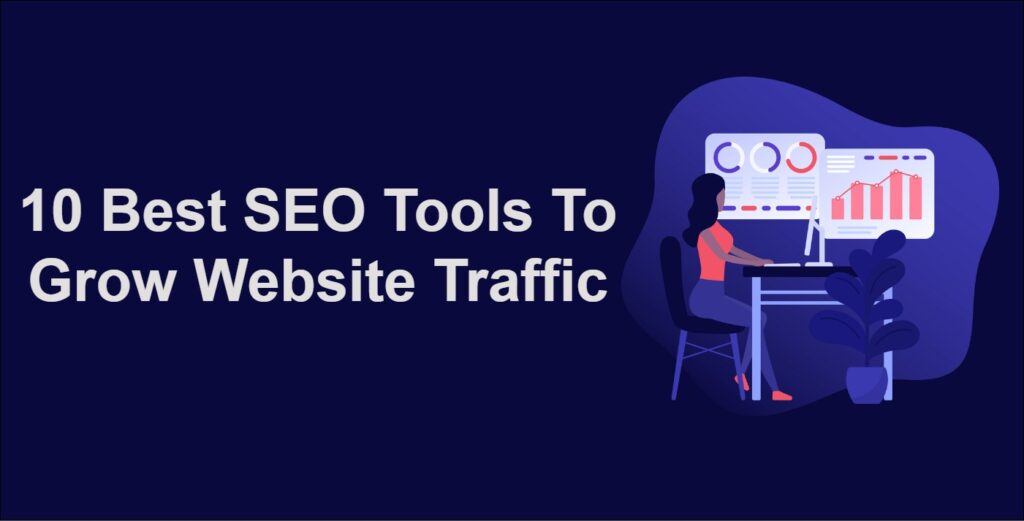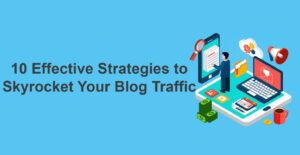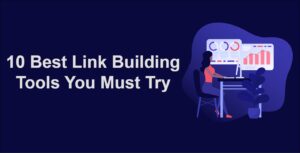Search engine optimization (SEO) plays a crucial role in driving organic traffic to your website. As the online landscape becomes more competitive, businesses are seeking effective ways to enhance their SEO efforts and attract more visitors.
In a competitive online landscape, SEO tools are essential for driving website traffic and improving search engine rankings. By utilizing the right tools strategically, businesses can gain a competitive edge, attract more targeted visitors, and achieve their online marketing objectives.
Thankfully, many SEO tools are available to assist in optimizing websites, analyzing data, and improving overall search engine rankings. In this comprehensive guide, we’ll look into the best SEO tools that can help you increase website traffic and achieve your online marketing goals.
Whether you’re a small business owner or a seasoned marketer, incorporating these SEO tools into your strategy can lead to increased visibility, engagement, and success.
The Importance of SEO Tools To Grow Website Traffic
One of the key reasons why SEO tools are essential for growing website traffic is that they provide valuable insights into your website’s current standing. They help you identify areas that need improvement, whether it’s optimizing your content, refining your keyword strategy, or enhancing your website’s user experience.
Using the right tools, you can conduct comprehensive keyword research, uncovering relevant terms and phrases that potential visitors are searching for.
1. Data-Driven Insights
SEO data-driven insights are valuable pieces of information that are derived from analyzing various data points related to search engine optimization. These insights provide actionable recommendations and strategies for improving your website’s visibility, ranking, and overall performance on search engines like Google.
By leveraging data-driven insights, you can make informed decisions to optimize your website and content, ultimately driving more organic traffic and achieving better results in your SEO efforts.
SEO tools provide valuable insights into your website’s performance, helping you understand what’s working and what needs improvement. These insights guide your optimization efforts and ensure they are data-driven.
2. Competitive Analysis
Understanding your competitors’ strategies and keywords is crucial for staying ahead. SEO tools offer competitor analysis, helping you identify opportunities and gaps in your own strategy.
3. Keyword Performance Analysis
Analyzing how specific keywords are performing in terms of search volume, click-through rates (CTR), and conversion rates can help you understand which keywords are driving the most valuable traffic to your site. This insight can guide your content creation and optimization strategies.
Effective keyword research is the foundation of successful SEO. SEO tools assist in identifying relevant keywords with high search volume and low competition, driving targeted traffic to your site.
4. Traffic Sources
Understanding the sources of your website traffic, whether it’s organic, referral, social, or direct, can help you allocate resources and focus on the channels that are delivering the best results. This insight can also reveal potential areas for improvement.
5. Technical Optimization
SEO tools highlight technical issues that can impact your site’s performance. These tools help you identify and rectify problems such as broken links, slow page load times, and mobile compatibility issues.
6. Content Optimization
Quality content is key to engaging visitors and ranking well in search engines. SEO tools analyze content for readability, keyword usage, and relevance, ensuring your content resonates with both users and search engines.
7. Backlink Profile Analysis
Evaluating the quality and quantity of backlinks to your website can help you understand your site’s authority and reputation in the eyes of search engines. This insight can guide your link-building strategies.
Building high-quality backlinks is vital for SEO success. SEO tools aid in identifying authoritative websites for potential link-building opportunities, enhancing your site’s credibility.
8. Monitoring and Reporting
SEO tools offer real-time monitoring and reporting, allowing you to track your progress, monitor changes in rankings, and adjust strategies as needed.
Top SEO Tools for Increasing Website Traffic
Let’s explore some of the best SEO tools that can help you optimize your website for higher traffic and improved search engine rankings:
1. SEMrush
SEMrush is a versatile SEO tool that provides a comprehensive suite of features. It offers keyword research, competitor analysis, backlink analysis, site audit, and more. SEMrush’s user-friendly interface makes it a favorite among marketers looking to boost their website traffic.
Here’s is the table summarizing the key features, pros, and cons of the SEMrush SEO tool
| Key Features | Pros | Cons |
| Keyword Research | Extensive keyword database | Steeper learning curve for beginners |
| Competitive Analysis | Identify competitor strategies | Data overload can be overwhelming |
| Backlink Analysis | Evaluate backlink quality and sources | Limited free plan with restricted data |
| Site Audit | Identify technical SEO issues | Advanced features may require technical knowledge |
| Content Analysis | Optimize content for target keywords | Might not cover all aspects of content optimization |
| Rank Tracking | Monitor keyword rankings over time | Reporting customization limitations |
| Social Media Tracker | Monitor social signals impacting SEO rankings | Integration challenges with certain platforms |
| Advertising Insights | Analyze and optimize paid ad campaigns | Not a complete all-in-one marketing solution |
2. Ahrefs
Ahrefs is renowned for its robust backlink analysis capabilities. It helps you explore your competitors’ backlink profiles, identify broken backlinks, and find new link-building opportunities. Ahrefs also offers keyword research, rank tracking, and site audit functionalities.
Below is a table that provides a summary of the essential features, advantages, disadvantages, and pricing details of the Ahrefs SEO tool:
| Key Features | Pros | Cons | Pricing |
| Backlink Analysis | Comprehensive backlink data | Relatively higher pricing | Lite: $99/mo |
| Keyword Research | In-depth keyword analysis | Steeper learning curve for beginners | Standard: $179/mo |
| Competitive Analysis | Identify competitor strategies | Limited free plan with restricted data | Advanced: $399/mo |
| Site Audit | Identify technical SEO issues | Advanced features may require technical knowledge | Agency: $999/mo |
| Rank Tracking | Monitor keyword rankings over time | Reporting customization limitations | |
| Broken Link Checker | Identify broken links on your website | Limited social media tracking | |
| SEO Toolbar | Access SEO metrics while browsing | Limited integration with other tools |
3. Moz
Moz offers a range of SEO tools, including Moz Pro and Moz Keyword Explorer. It provides insights into keyword difficulty, on-page optimization, and site health. Moz also offers a free browser extension, MozBar, for quick SEO analysis of any webpage.
Below is a table that provides a summary of the essential features, advantages, disadvantages, and pricing details of the Moz SEO tool
| Key Features | Pros | Cons | Pricing |
| Keyword research | User-friendly interface | Advanced features require higher plans | Standard: $99/month |
| Site audit | Comprehensive educational resources | Limited backlink database | Medium: $179/month |
| Backlink analysis | Regular updates and improvements | Can be costly for small businesses | Large: $249/month |
| Rank tracking | Access to Moz community and support | Limited rank tracking capabilities | Premium: $599/month |
| On-page optimization | Whiteboard Friday video series | Some features available in free version | Custom: Contact for pricing |
| Competitor analysis | MozBar browser extension for quick data |
4. Google Search Console
Google Search Console is a free tool provided by Google that allows you to monitor and optimize your website’s presence in Google search results. It provides data on search queries, clicks, impressions, and more. Search Console also alerts you to potential issues affecting your site’s performance.
Below is the summary of the essential features, advantages, disadvantages, and pricing details of the Google Search Console SEO tool.
Google Search Console is a free tool provided by Google, there is no associated cost for using it.
| Key Features | Pros | Cons | Pricing |
| Search performance | Free and provided by Google | Limited to data for your own website | Free |
| Index coverage | Direct integration with Google | Limited advanced SEO features | |
| URL inspection | Provides insights into Google’s view | Limited historical data | |
| Mobile usability | Identifies mobile issues and optimization | Focuses primarily on Google search | |
| Sitemaps submission | Helps ensure proper indexing | Limited data export options | |
| Manual actions | Alerts for manual penalties | No competitor analysis |
5. Ubersuggest
Ubersuggest is a user-friendly tool that offers keyword research, content ideas, and competitive analysis. It helps you discover new long-tail keywords, track rankings, and identify content gaps to increase your website traffic.
Ubersuggest key features, pros, cons, and pricing.
Ubersuggest offers a free version with limited features, making it accessible to users who are just starting out. Paid plans offer more advanced features and higher limits for usage.
| Key Features | Pros | Cons | Pricing |
| Keyword research | Offers a free version | Limited features in free version | Free |
| Competitor analysis | User-friendly interface | Less comprehensive than some tools | Individual: $12/month |
| Backlink analysis | Provides keyword suggestions and volume | Limited historical data | Business: $20/month |
| Content ideas | Includes domain and keyword metrics | Less advanced features | Enterprise: $40/month |
| Site audit | Generates site health reports | Limited export options | |
| Rank tracking | Offers insights into search rankings | May lack precision in data |
6. Screaming Frog
Screaming Frog is a powerful website crawler that provides insights into technical SEO issues. It identifies broken links, duplicate content, missing meta descriptions, and other on-page issues that can impact your site’s performance.
Screaming Frog offers a free version with basic crawling and auditing capabilities
The paid version, priced at £149 per year, provides more advanced features and greater crawling limits.
| Key Features | Pros | Cons | Pricing |
| Website crawling and auditing | In-depth website analysis | Limited to on-site analysis | Free |
| On-page SEO optimization | Identifies broken links and issues | No off-site analysis capability | Paid: £149/year |
| Link analysis | Offers comprehensive data | Interface may be overwhelming | |
| Data visualization | Generates customizable reports | Paid version can be expensive | |
| Custom extraction | Helps uncover technical SEO issues | Limited keyword analysis |
Strategies for Using SEO Tools to Increase Website Traffic
While SEO tools are valuable on their own, using them strategically can yield even better results:
1. Conduct Thorough Keyword Research
Use keyword research tools to identify relevant keywords with high search volume and low competition. Targeting these keywords in your content can attract more organic traffic.
- Utilize keyword research tools to identify relevant and high-ranking keywords related to your industry.
- Analyze keyword search volume, competition, and trends to target the most valuable keywords.
- Focus on long-tail keywords to capture more specific search intent.
2. Monitor and Analyze Competitors
Leverage competitor analysis tools to understand your competitors’ strategies. Identify keywords they’re ranking for and uncover opportunities you may have missed.
- Identify your competitors using SEO tools and analyze their strategies.
- Evaluate their top-ranking keywords, backlinks, and content strategies.
- Leverage this information to develop your own competitive SEO strategy.
3. Optimize On-Page Content
Content optimization tools to ensure your on-page content is user-friendly and optimized for search engines. Focus on providing valuable information that addresses users’ needs.
- Use on-page SEO tools to optimize your website’s content and structure.
- Ensure proper keyword placement in titles, meta descriptions, headings, and content.
- Optimize images, URLs, and internal linking for better user experience and search engine visibility.
4. Build High-Quality Backlinks
Backlink analysis tools help you identify authoritative websites for potential link-building opportunities. Building quality backlinks can improve your site’s credibility and rankings.
- Analyze your existing backlinks and identify toxic or low-quality ones using backlink analysis tools.
- Build high-quality backlinks through outreach, guest posting, and content marketing.
- Monitor your backlink profile to ensure it remains healthy and authoritative.
5. Regularly Monitor Progress
Utilize monitoring and reporting tools to track your progress over time. Regularly analyze data to identify trends, make informed decisions, and adjust strategies as needed.
- Integrate SEO tools with Google Analytics to track user behavior and conversion rates.
- Analyze data to make informed decisions about strategy adjustments.





